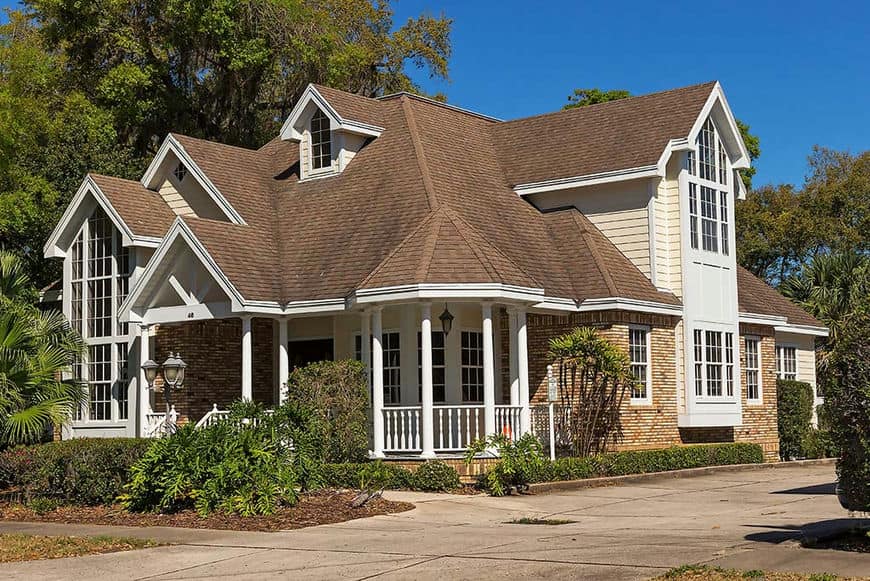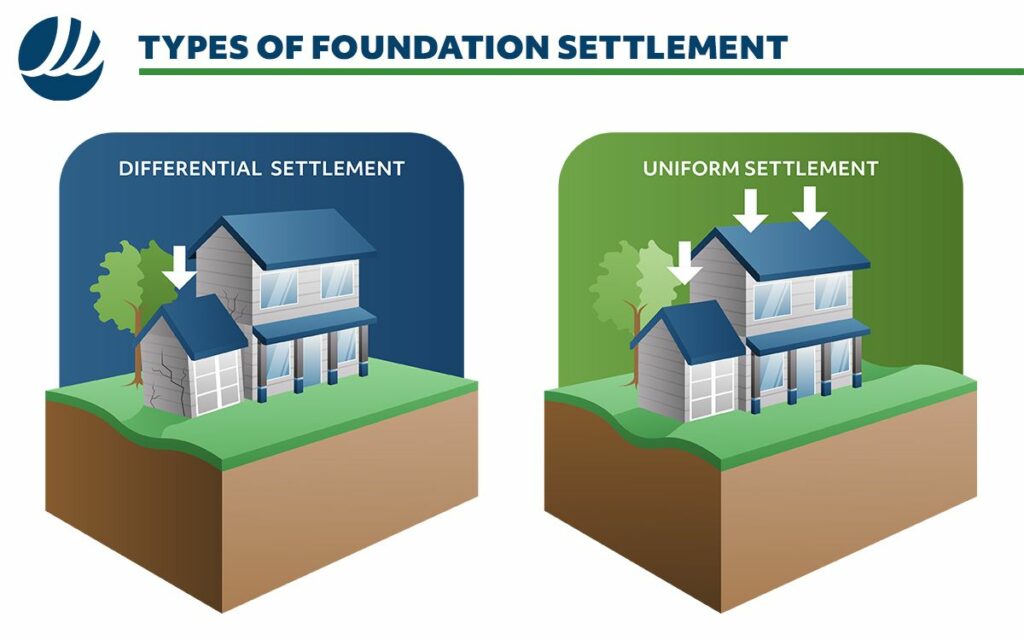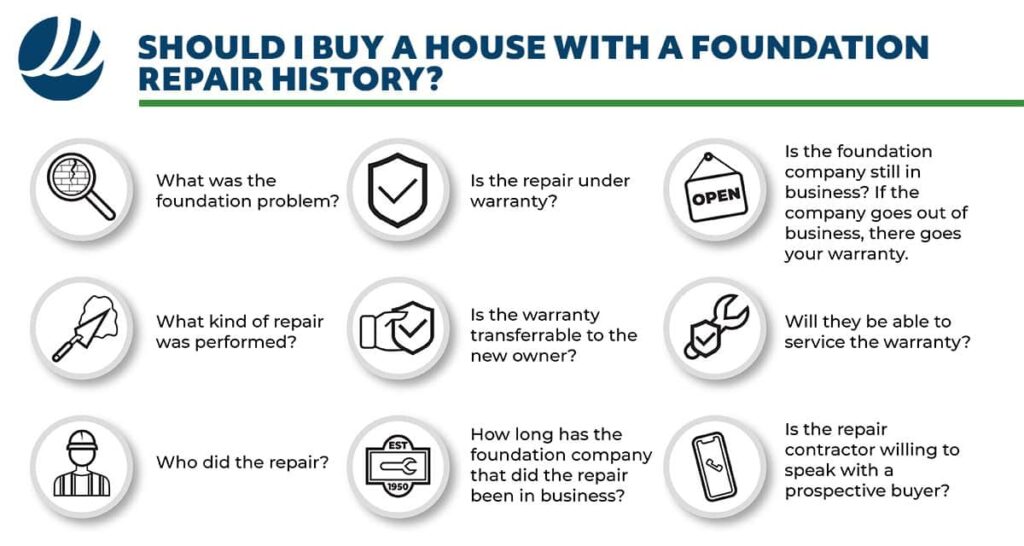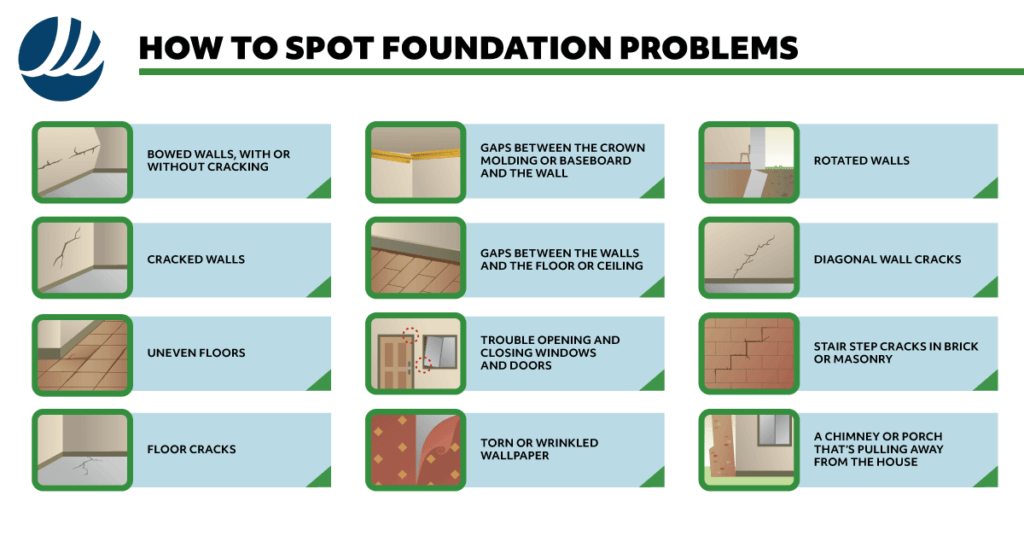
If you’re searching for “should I buy a house with foundation repair,” you’ve landed on the right page. Buying a house with a foundation repair can make some people a bit nervous, which is understandable. However, a past foundation repair doesn’t mean you should automatically walk away from the home. Sometimes it’s even a plus.
This article is not real estate advice. We’re going to explain what you need to know about buying a house with a foundation repair history from the perspective of a foundation repair professional.
What Causes Foundation Problems?
Foundation problems are almost always caused by differential settlement. This is when the home’s foundation settles into the soil unevenly. (See illustration below) Differential settlement puts stress on a foundation and leads to structural damage. It’s caused by various things, including,
- Soil that wasn’t adequately compacted before construction started – Before construction starts, the soil must be adequately compacted so the house won’t settle into the soil unevenly after it’s built.
- Water – If your home is built on clay-rich soil, the soil swells as it absorbs water and then shrinks as it dries out. This causes movement under the foundation, which can eventually lead to trouble. If your home was built on soil prone to erosion, water could wash away soil under the foundation leading to void formation. When the house sinks into the voids, you have differential settlement.
- Excavation next to the foundation – This is like digging a hole too close to a chair on a lawn. Eventually, the chair will fall into the hole. While your house probably won’t fall into the big hole your neighbor is digging, heavy excavation too close to a foundation can cause trouble.
- Earthquakes and other natural disasters – It goes without saying that natural disasters can damage a foundation.
- Weather changes after construction – Let’s say you build a house on top of clay-rich soil during the dry season. When the rainy season comes around again, the soil will absorb water and swell. This can lead to foundation problems.
Foundation problems aren’t unusual, and they don’t necessarily mean the home was built incorrectly.
Sellers Are Required to Disclose Any Foundation Problems
Sellers who know a home has a foundation problem must disclose it. The thing is, many sellers don’t know the home they’re selling has a foundation problem. Therefore, it may be up to you, the buyer, to discover any foundation issues.
Sellers Are Required to Disclose a Foundation Repair History
Sellers must also tell the buyer if the house has a foundation repair history, provided they know about it. Ask the seller when the foundation was repaired, what was done, and if there’s a transferrable warranty. Keep in mind that the warranty is only as good as the company offering it. Are they still in business? Will they be in business in five years?
If the seller doesn’t disclose a foundation repair history, you can ask if there has been one, but don’t take their word for it. Always get the home inspected by either a foundation repair contractor or a structural engineer before you sign anything, whether the seller disclosed a foundation repair history or not.
Should I Buy a House With a Foundation Repair History?
If you’re thinking about buying a house with a foundation repair history, you’ll want to know the following:
- What was the foundation problem?
- What kind of repair was performed?
- Who did the repair?
- Is the repair under warranty?
- Is the warranty transferrable to the new owner?
- How long has the foundation company that did the repair been in business?
- Is the foundation company still in business? If the company goes out of business, there goes your warranty.
- Will they be able to service the warranty?
- Is the repair contractor willing to speak with a prospective buyer?
A foundation repair history doesn’t necessarily mean a house was built incorrectly. Also, a foundation repair that was done correctly leaves a foundation stronger than before and will usually last for the house’s lifetime. For example, if underpinning was performed due to foundation settlement, there are now piers supporting the house that go down to load-bearing soil. In other words, it’s unlikely that the house will experience further problems with settlement.
Of course, we never want to say never. Although the house probably won’t need more work, there’s always a tiny chance it will. However, this is also true of a house that doesn’t have a foundation repair history.
What you should always do before buying a house is get an independent foundation repair contractor or structural engineer to inspect the foundation. They will let you know if the foundation is sound or needs to be repaired.
For more information, see Is It Safe To Live In A House With Foundation Problems?
What if an Inspection Uncovers Unrepaired Foundation Problems?
If the structural engineer or foundation repair professional you brought in uncovers a problem with the foundation, you can figure the repair cost into your offer. (Structural engineers won’t be able to give you a repair estimate. However, you can take the structural engineer’s report and repair solution recommendation to a foundation repair contractor for an estimate.) Of course, this is assuming the inspector says the house is otherwise sound and the repair will fix the problem.
Signs a Home Might Have Foundation Problems
If you’re looking to buy a house, you should be familiar with the most common foundation problem signs. These include:
- Uneven floors
- Wall cracks
- Bowed walls
- Mold in the basement or crawl space
- Ceiling cracks
- Doors and windows that don’t open and close properly
- Gaps between the wall and the baseboard or between the wall and the crown molding
- Gaps between the ceiling and the wall or between the floor and the wall
- Torn or wrinkled wallpaper
- Diagonal wall cracks wider than 1/10 inch
- Stair step cracks in brick or masonry
- Chimneys and porches that are separating from the rest of the house
For more information, see What Is Underpinning A Foundation And When Is It Necessary?
Contact KC Waterproofing and Foundation Repair today if you’re thinking about buying a house in Kansas City and would like us to evaluate the foundation.









